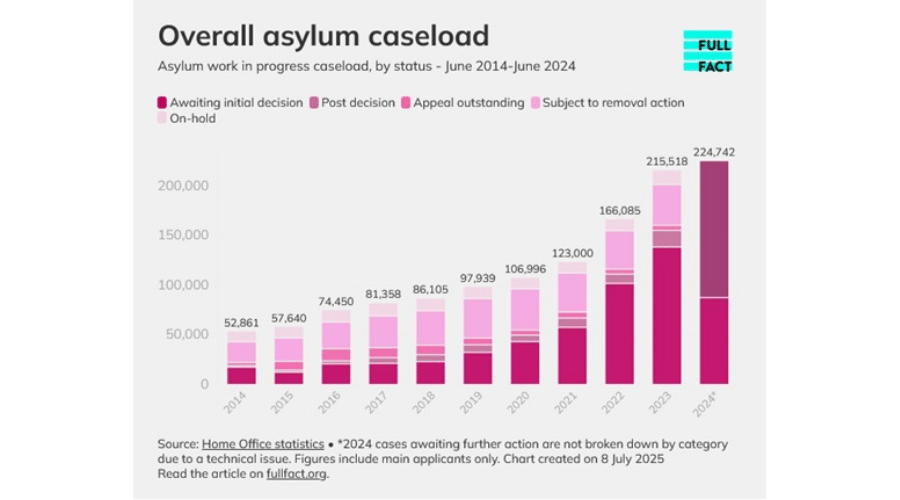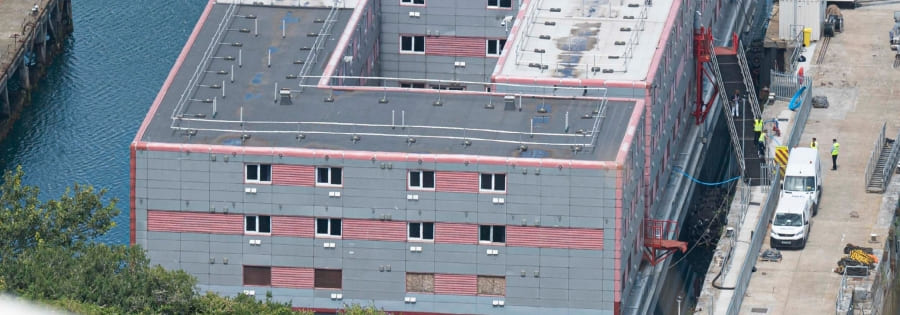Asylum accommodation – latest on hotels and barracks
The costs of asylum accommodation stay high while the government promises cost savings and less use of hotels. At the same time, it plans to use more large sites such as Wethersfield. Here is the latest news.
As the newsletter was going to press, disturbances around asylum hotels were occurring in Epping, Norfolk and Canary Wharf. Nabil, a resident of the Epping hotel, wrote a letter to The Guardian calling for “understanding and fairness.” The prime minister drew protests when he promised to release the locations of asylum hotels to delivery firms, to tackle unauthorised working by asylum seekers – a move likely to result in more publicity about which hotels are being used.
In a separate development, Keir Starmer claimed that there is “lots of housing” for asylum seekers than can be used instead of hotels. The claim prompted rebuttals from councils and campaigners who say the supply is at breaking point.
It then emerged that a Google search using the phrase “evicting council tenants for asylum seekers” generated an AI response which began by saying “It is a complex issue…”, as if it were a reality. Nearly Legal was “more than a little furious,” calling the search response “horsesh*t of the highest order.” Google search has now removed the AI response.
Meanwhile the BBC reported a growing problem of single asylum seekers refusing to move from hotels. It gave no explanation of why they might refuse to move (e.g. because a move might take them away from an area where they now have local connections).
Government promises on asylum accommodation expenditure
The government’s June Spending Review included £200 million to accelerate the transformation of the asylum system and end the costly use of asylum hotels in this parliament by “clearing the asylum backlog, increasing appeals capacity and continuing to return those with no right to be here.” These reforms will deliver a “more affordable and sustainable asylum system”, meaning that asylum costs will fall by at least £1 billion per year by 2028/29 compared with 2024/25. The Guardian noted widespread scepticism about whether the government promise will be met.
Home secretary Yvette Cooper in an article in The Times on July 26, headed “fixing asylum the British way”, repeated the pledge to “end asylum hotels altogether.”
In the meantime, new figures show that the Home Office plans to spend £2.2 billion of overseas development assistance this financial year on asylum accommodation – only marginally less than the £2.3 billion it spent in 2024/25.
Despite the promise to clear the asylum backlog, the latest tribunal quarterly statistics show that the immigration tribunal’s total appeals backlog stood at 90,389 cases as at 31 March 2025. At the same time in the previous year it was 50,332 cases. The backlog of asylum claims, which stood at a record 134,000 at the end of 2023, was down to 91,000 a year later. Full Fact has a briefing on the asylum backlog; the chart shows the makeup of the current asylum caseload.

Free Movement comments:
“The reason for the increase in the number of asylum appeals lodged is easy to discern: the current government is clearing the initial decision backlog left by the last government. The previous government basically shut down asylum claim processing while continuing to register new asylum claims, leading to a massive backlog. The current government is, rightly, clearing that backlog. And that means a lot of decisions being made in a short time period. And the vast majority of those whose claims are refused will lodge an appeal against that refusal.
“Given that so many of those appeals go on to be allowed — 43% in the most recent quarter — an obvious solution would be to grant asylum more often in the first place, meaning that fewer appeals end up being lodged.”
A report in May by the National Audit Office examines asylum accommodation contracts and finds the Home Office has higher costs than expected and limited control over spending. Projected spending over the 10-year term of the current contracts has increased from an initial estimate of £4.5 billion to £15.3 billion, because of both rising numbers seeking asylum and the use of hotels as contingency accommodation. The Daily Telegraph headlined: “Revealed: The true cost of asylum hotels.”
The Big Issue is the latest media outlet to cover the proposal by Kate Wareing from Soha Housing in Oxfordshire to reduce asylum accommodation costs by buying properties which can later be used as temporary accommodation for homeless households (see previous newsletters).
A briefing for the Home Affairs Committee covers the contracts for asylum accommodation and support and describes the Home Office’s approach, the contractors’ performance and their profitability.
London council considers legal action against Home Office over asylum seeker support
The London Borough of Hillingdon is considering legal action against the Home Office over the cost of supporting asylum seekers. The Local Government Lawyer says that an average of 3,000 asylum seekers are estimated to be housed in the borough at any one time – more than double the national threshold.
Hillingdon sees hundreds evicted every month, whom it then has to take responsibility for by offering assistance or help with finding suitable accommodation. The cost of this duty is reported to have resulted in an estimated £5 million shortfall in 2024/25 and £11.3 million in the last five years.
In March, the government issued its funding instruction for local authorities who are eligible for the Asylum Grant 2025-2026. The grant provides funding to support local authorities with the costs of supporting asylum seekers in their areas.
More evidence that asylum hotels are unsafe
In the middle of last year’s disturbances an asylum hotel in Bristol was left unprotected from a violent mob after police chiefs sent officers to the wrong hotel. Police were told to go to the Holiday Inn in Temple Meads, when the target of the far-right protest had been widely advertised as the Mercure Hotel in Redcliffe. Only a group of up to 100 counter-protesters protected the hotel and the families inside.
“My father came to the UK to find safety – but he died alone in an asylum hotel”, ran the headline to another story, in The Independent. An inquest has been held relating to Victor Hugo Pereira Vargas, who killed himself in his room at a Home Office asylum hotel in October 2023. Earlier he had made a desperate attempt to leave the UK, turning up at Gatwick airport and asking immigration officers to put him on a plane out of the country. Staff at the hotel were “not appropriately” trained to deal with vulnerable people, the coroner ruled. Home Office officials in charge of the hotel contract were also unaware that these crucial roles had been subcontracted out.
Asylum sites to be expanded as ministers bid to end hotel use
Large asylum seeker sites like Wethersfield air base in Essex are set to be expanded under plans to end the use of asylum hotels, the BBC reveals. One of the ways the Home Office hopes to end hotel use is by moving asylum seekers into cheaper accommodation. Sir Keir Starmer pledged to close the Wethersfield asylum facility during last year’s election campaign, but capacity has recently been increased to 800 men. A contract has also been placed to reopen the notorious Campsfield detention centre in Oxfordshire.
The charity Doctors of the World said on May 13 that the government must close Wethersfield camp. They issued a new report based on medical data and interviews with the men held at Wethersfield in 2024, which highlights mental health distress amongst patients and protection concerns at the site.
High Court finds the home secretary acted unlawfully at Wethersfield
In March, in a case brought by Deighton Pierce Glynn and supported by various groups, the High Court found that the home secretary acted unlawfully by accommodating three vulnerable asylum seekers at RAF Wethersfield. They are victims of trafficking, torture and/or serious physical violence who each suffered a serious decline in their mental health because of living at Wethersfield.
In summary:
- The Home Secretary acted unlawfully and in breach of her duties under the Immigration and Asylum Act 1999 by accommodating three vulnerable asylum seekers – TG, MN, and HAA – at RAF Wethersfield.
- In relation to TG, the Home Secretary also failed to make reasonable adjustments for his disabilities under the Equality Act 2010.
- The Home Secretary had made “a most serious and inexplicable omission” in failing to assess the equalities impact when amending asylum accommodation policy. The Judge found that “this amounted to the clearest failure on the part of the defendant to fulfil the PSED [the public sector equality duty]” and in the final order has quashed the policy as it applies to Wethersfield.
- The High Court rejected a systemic challenge to the arrangements for allocating asylum seekers to Wethersfield barracks, but this was on the basis of what the arrangements looked like in July 2024 at the time of the hearing.
The judgment leaves the door open for individual challenges and also damages claims.







